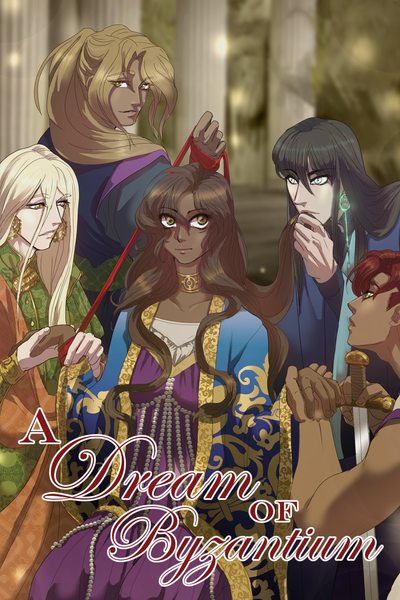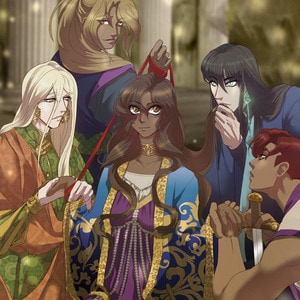The central forum was much like she’d imagined Rome would’ve looked like in its glory days. It was mostly enclosed by sandstone walls; its gate was permanently open, prepared only in case of an attack. Once past the entrance a complex of buildings and courtyards would open to the eye, all built in the same sandstone. It was jarring when compared to the part of the city she’d been staying in so far: this looked like an insert of some zealous governor, built all at once rather than organically and over a number of years. Palm trees were numerous, planted like pillars to cut streets in two.
The actual forum and main feature of that district was a circular building surrounded by rows of pillars as tall as three stories. It shone bright and warm under the sunlight, forcing her to shield her eyes from the brightness. As if to underline its significance, those who went in and out of the forum were of a different breed to the populace outside of the walls: the clothes were made of fine white cotton, mostly airy tunics that were embellished with shawls and stoles of fine, colourful silk. These were the elect, the wealthy citizens; although for all intents and purposes the difference was only skin deep, as they regarded them with the same vacant curiosity that the rest of the Caudiceans had offered them.
Inside the floor was divided into two by a ring of pillars. Marble tribunes surrounded the inner circle, with four entrances to the speaking area. Those who had a seat gathered in the stepped tribunes, sitting in plush pillows. Those who didn’t tried their best to see what was happening from the other side of the pillars, piling onto the entrances like an audience looking for the best seat in the theatre. In the centre, stood the magistrate.
The man was in his mid-fifties, was fairly rotund, and at first looked elated when Phobos and Aristides emerged from the swarm of watchmen. His open mouth, ready for his initial speech, swiftly closed when he saw her: the giddiness disappeared, replaced instead by cautious weariness.
“My apologies for not being able to meet you in more private settings,” he said, addressing her directly and foregoing any acknowledgment of the other two. “Given the circumstances of the crime, and the gravity of its repercussions, this had to be brought to the forum.”
Ophelia looked at Aristides, unsure if she was meant to answer. “That’s quite alright,” she said, clearing her throat after the older warrior arched an eyebrow at her. “I’m just hoping we can get this over with quickly.”
She figured she could imagine she was talking to any other bureaucrat, and that made her feel slightly better. The magistrate was about to speak in response, but as an accident of time she spoke over him, “What exactly do we need to argue here? You know our identities; our acquaintance was casual. My husband just happened to be from the same country.”
The man was taken aback, yet didn’t seem offended. “May we take your names and position for the scribe?”
“I’m Ophelia Luccieni Ascot of the Iceni” she turned around towards her companions as she couldn’t quite remember their made up identities. They picked that up fast enough.
“I’m Golgotas of Lyre, and this is my foster-son Demora of Palmyra.”
The magistrate nodded.
“What brought you here to Caudiceum, lady Iceni? And in such company?”
Ophelia looked around the room, and felt slightly nauseous at being the centre of attention. “I was kidnapped in Hibernia; then carried to Iberia to be sold off. Demora and my father-in-law were both working for my captors. We fell in love, and we escaped; we thought of making our way to Hibernia to announce our marriage, but decided to do it in the Phrygian way with my father-in-law as our chaperone.”
Murmurs exploded from silence into echoes around the forum; she saw mocking smiles, disbelieving stares, and some surprised expressions. “Your Iberian is impeccable, lady,” the magistrate commented. “Is that a custom among the Hibernians, to teach their princesses the languages of the continent?”
Ophelia felt a bit naughty.
“It’s so we can better understand their screams when we raid them, your honour,” she said. The older man chuckled a bit nervously.
“Conversations with Hibernian merchants sure are difficult; they are, however, nothing compared to a princess,” he commented. “So what is it that your husband and your father-in-law were doing on the night the men were murdered?”
“We were performing the rites of our moon night. Are you familiar with how the Phrygians celebrate their marriage, your honour?”
“I’m afraid so; strange as they are, I’ve seen quite a few in my time. Is there anyone else who can vouch for you?”
“The tavern owner, and her helper.”
The magistrate then turned towards Phobos. “You are a mercenary, where are your weapons?”
Two of the watchmen approached the man, carrying Ilmarinen’s spear and the long knives. “Fairly light for a warrior from Phrygia. And your sword?”
“I sold it to pay for our travel here.”
The magistrate’s eyebrows shot up. “I wonder if that’s a mark of love, or untruth. That a warrior would be without its sword, that is hard to fathom.”
“We don’t treat women as passing fancies like Iberians do, my lord,” Phobos said with a scowl. “Warrior or not, in our country we believe that a good wife is worth a hundred oxen. What’s a sword to compare?”
He earned himself a couple of laughs from the men in the forum. The magistrate, clearly amused, said, “I shall wish you luck; that two nations so opposite in character and customs should meet in marriage is certainly an augury of something.”
A few more questions followed, but it was clear their argument had worked in some way or another. Ophelia was addressed primarily as the one who presumably held the highest rank; it was clear that just as Aristides predicted, the Caudiceans were afraid of inciting the ire of ‘her’ people, and thus no outright accusations were made. The suspicious stares never disappeared; as they left the building, there was little the watchmen could do to shield them from the murmurs and the speculation of those around them.
When they were about to step into the large courtyard that led to the forum, Ophelia saw a group of men to the side, clearly watching with interest the proceedings. They wore strange tunics of a light blue colour. The fabric was very thin, almost transparent, and was layered gracefully on their bodies. It shimmered golden every time the wind made it move.
“Elysians,” Aristides explained to her.
The two warriors and her were escorted back to the tavern along with a scribe. She witnessed with great interest how the petite woman, one of the officials working in the forum, wrote down Felicia’s and Lucio’s statement on a wax tablet the size of her forearm. They were warned against leaving the city until the Magistrate allowed them to do so, and finally the watchmen left.
“I’ve got good news,” Felicia announced later in the evening. The four huddled together around empty bottles of wine that Aristides had procured to ease off the tension after the hearing. “A servant came over earlier to ask after what had happened. He belongs to a Chaldean merchant, one I’ve seen before in the city. Apparently he arrived yesterday and is looking to set sail in the next fortnight. This man, he’s rich enough that he’s got this entire city in his pocket; in a blockade like this, his are the only ships going in and out of the port.”
“A Chaldean?” Phobos asked. “He’s got to have come with a pretty big retinue.”
“Do you think we could sneak in as servants? Or perhaps offer our services as bodyguards?”
Felicia shrugged. “He’s an elusive one. I would not think it’s as simple as showing up and offering your services. You ought to have an invitation before being able to meet him.”
“However, they say he loves to frequent oriental brothels,” she offered.
“I wonder,” Aristides murmured. “While the city is closed like this, should we ought to try and find a space in one of his ships?”
It was too late in the night and they were all too drunk to come up with sensible plans. Soon Felicia and Aristides retired, leaving Phobos and Ophelia in a comfortable silence. The prince cleared his throat at some point, clearly after a long process of trying to find the right words for her.
“I… want to thank you for what you did today,” he said, finally. “We couldn’t have gotten away with it if it wasn’t for you. I also realise this is probably confusing since you’re… not from here. You’ve done something very brave, and I want to thank you for it.”
In the dim light of the candles, Phobos’ face looked softer; his intense stare was glazed over with warmth. “I also want to apologise for what happened the other day; I thought you were an Elysian and with everything that was happening… I was unfair to you.”
Ophelia nodded, trying to look away from the vision in front of her. “It’s alright. I wanted to help.”
“I also intend to take responsibility,” his voice became more serious. “In everyone’s eyes you’re a married woman; to be seen without your husband is very shameful. It would be dishonourable for me to take advantage of you like this and then throw you away.”
“I don’t understand,” Ophelia confessed.
“We don’t need to carry out the rites,” Phobos blushed. “But I intend to accompany you as your husband.”
Ophelia held up her hands.
“Uhm, I think this is a bit rushed. You don’t need to; really.”
“If you were younger perhaps some men would turn a blind eye to it, but you’re twenty-seven already… It will be difficult for you to find a good family to marry into…” The man seemed lost in his own thoughts, “unless maybe there are some Phrygian families I could present to you once I take back my throne?”
“Uh, it’s fine, Phobos. I’ll be fine,” seeing that he was not listening to her, Ophelia took one of his hands. The gesture startled him, and he blushed more deeply. “Marriage is not something that I can say I worry about.”
The man pursued his lips. “As long as we travel together, I’ll assume responsibility for my part. It’ll be safer for you, I assure you.”
“Travel? What if I want to stay here?”
“The authorities believe we’re married; it’ll be strange for a husband to leave without his wife.”
It then dawned on Ophelia the consequences of her little white lie. In Caudiceum, her fate was tied to Phobos’. The realisation shook some of the tipsiness out of her. She had already grown used to the tavern and had taken a liking to Felicia and Lucio; while not easy, she enjoyed her life there. “But Felicia…”
“She understands.”
“Very well,” Ophelia licked her lips. “I am in your care, then.”











Comments (0)
See all